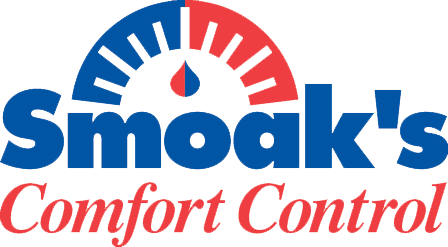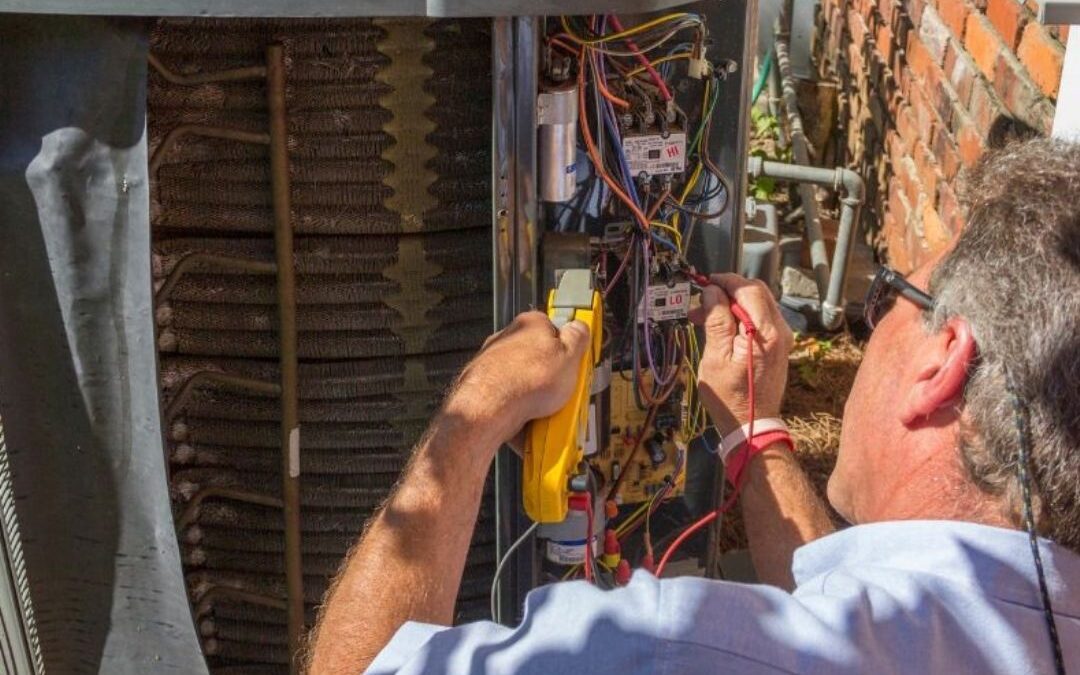When your air conditioning units stop blowing cold air, it can quickly turn a comfortable home into a stifling space, especially during the heat of summer. This issue can stem from various causes, each needing a specific solution. In this comprehensive guide, we’ll explore why your AC might not be blowing cold air, how to troubleshoot these issues, and when to call in the professionals from Smoak’s Comfort Control.
Understanding Your Air Conditioner
1. How Does a Central AC System Work?
A central air conditioning system uses a liquid refrigerant to cool the air. The refrigerant passes over the indoor evaporator coils to absorb heat from the home. As it absorbs heat, the refrigerant transforms into an icy gas. The AC unit’s fan blows across these refrigerator-cooled coils, pushing cooled air through the ductwork and into your living spaces. Now carrying the absorbed heat, the gas-form refrigerant travels back to the outdoor condensing unit. Then, it releases the heat to the outdoor air and transforms it back into a liquid, ready to start the cooling cycle again. Understanding this process can help you identify where issues might arise in your air conditioning system.
2. Thermostat Settings – The Final Check
Before diving into more complex diagnostics, start with your thermostat settings. Incorrect settings are one of the most straightforward issues to fix. Ensure your thermostat is set to “cool” and not “heat” or “fan,” and check that the temperature setting is lower than the current room temperature. It’s not uncommon for human mistakes in thermostat settings to sometimes explain why you’re experiencing warm air instead of cool air.
A central AC system draws warm air from your home, cools it, and then pushes cooled air through the ductwork and into your living spaces. Properly maintained air ducts are essential for ensuring that the cooled air is efficiently distributed throughout your home.
3. Dirty Air Filters – A Common Culprit
One of the most common reasons an air conditioner does not blow cold air is a dirty air filter. When filters are clogged, airflow is significantly reduced, which can impede the efficiency of your air conditioning system. This can cause your unit to work harder than necessary, potentially leading to more significant problems like frozen evaporator coils. Regularly checking and replacing dirty filters can save you much trouble and keep your air conditioning unit running smoothly.
4. Refrigerant Leak – A Serious Issue
If your air conditioning unit is low on refrigerant, it will struggle to blow cold air. Refrigerant leaks cause your system to underperform and lead to significant damage and higher energy costs. Signs of a refrigerant leak include hissing noises, ice on the lines, and the unit constantly running without improving the temperature. Handling refrigerants involves safety and environmental concerns, so having a certified AC technician from Smoak’s Comfort Control handle this issue is best.
5. Condenser Unit Problems – Key to Cooling Efficiency
The condenser unit, usually located outside your home, plays a crucial role in the cooling process and can be a reason for blowing warm air if not functioning correctly. If the condenser is dirty or obstructed, it won’t be able to expel heat from the refrigerant effectively. Ensure the area around your condenser unit is clear of debris and foliage. A malfunctioning condenser can also stem from internal damage or electrical issues requiring professional attention.
6. Problems with the Evaporator Coil or Condenser
The evaporator coil is crucial for absorbing heat but can be prone to problems like mildew and mold buildup. Additionally, if the refrigerant level is low, the coils can freeze, causing significant disruptions in your air conditioning unit. Similarly, the condenser, which expels heat from the refrigerant, can wear out over time or become obstructed. If your AC is not blowing cold air, it might be due to issues with these components. In such cases, it’s best to contact an HVAC professional to diagnose and fix the problem.
7. Compressor Malfunction – A Critical Component
The compressor is like the heart of your AC unit—it controls all the other parts of your air conditioner. If your AC is not blowing cold air, a malfunctioning compressor could be the culprit. Signs of a broken compressor include a shaky, noisy unit or moisture around your AC system. Since the compressor is essential for circulating refrigerant and maintaining the cooling cycle, any issues can severely impact your air conditioning system’s performance. If you suspect a compressor problem, it’s crucial to get it checked by a professional.
8. Duct Leaks – Hidden Disruptors
Leaky ductwork can lead to significant cooling loss, with cooled air escaping and hot air entering before it reaches your living spaces. This problem often results in some rooms being cooler than others or your air conditioner working overtime to achieve the set temperature. Inspecting and repairing damaged ductwork and leaks is a task for HVAC professionals to ensure your entire air conditioning system functions as a cohesive unit.
9. Overlooking the Air Conditioning System’s Age
The age of your HVAC system can significantly affect its efficiency. Older systems may not cool as effectively as newer models and can be more prone to problems like not blowing cold air. If your system is over 10 years old, consider upgrading to a more energy-efficient model that can provide better cooling and lower energy bills.
10. Heat Pump Issues – When Heating Technology Affects Cooling
If your home uses a heat pump for heating and cooling, issues, like blocked supply vents or a malfunctioning reversing valve, can cause the system to blow warm air instead of cold. Heat pumps are complex systems that benefit from regular maintenance to ensure they operate efficiently throughout the year.
11. Electrical Problems – An Overlooked Cause
Electrical issues, such as tripped breakers or burnt-out capacitors, can prevent your air conditioning unit from operating correctly. Suppose your AC is not blowing cold air, and you notice other signs of electrical problems, such as flickering lights. In that case, contacting a professional is crucial to resolve these issues safely.
12. Power Issues and Tripped Circuit Breakers
Imagine an AC fix as easy as flipping a switch. You’re in luck if your AC stopped blowing cold air because of a tripped circuit breaker. AC units usually use two circuit breakers, one inside and one outside. If your outside breaker is tripped, you’ll notice the air conditioner running but blowing warm air instead of cool. No problem. A quick breaker reset will make you good to go. However, if the breaker keeps tripping, it could indicate a more serious electrical issue that needs professional attention.
13. Poor Maintenance – The Root of Many AC Problems
If you’ve checked the more straightforward solutions and your air conditioner is still not blowing cold air, it might be time to call the experts. Professional AC technicians can diagnose complex problems that aren’t easily identifiable and ensure your air conditioning system is repaired correctly.
Keeping Your Cool with Smoak’s Comfort Control
If you’ve checked the more straightforward solutions and your air conditioner is still not blowing cold air, it might be time to call the experts. Professional AC technicians can diagnose complex problems that aren’t easily identifiable and ensure your air conditioning system is repaired correctly. Contact the experts at Smoak’s Comfort Control to schedule an appointment for air conditioner repair today.

